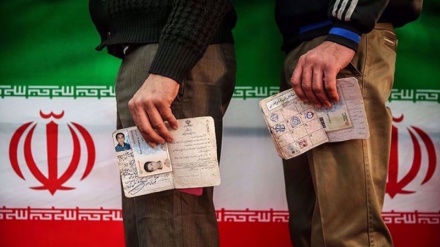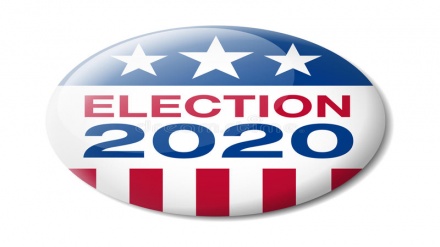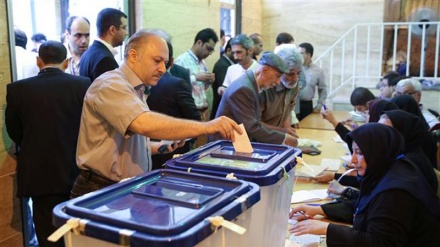Elections: A glance at diversity and scope of elections in Iran
The 12th presidential elections will be convened concurrent with the 5th Islamic city and village council vote on May 19. Today, we study and discuss the range and diversity of elections in the sacred Islamic system.
This year another election will be held in Iran. Elections in the sacred Islamic establishment are based on religious democracy. The scene of elections, especially the presidential vote, is one of the the most enthusiastic and attractive manifestations of presence of people in the scene.
Meanwhile, throughout every election which is held in Iran, the hostile media state sheer lies and stage propaganda campaigns against elections. For example, a BBC Persian presenter baselessly claims: “Majority of experts on Iran’s affairs had predicted that the number of participants in election would be negligible and the ruling system will have no option other than publishing fake figures on the number of participants.”
Prior and after the elections, the hostile media try to sabotage public trust in Iran. For instance, BBC Persia presenter tells his guest: “We spoke to you on several occasions in our live program and every single time you were suspicious, given that the vote count is belated. You said that seemingly a number of incidents are taking place and the actual votes of people have not been read. Now, what is your take on this?
Cast doubts remain to this day. Given that they are gradually announcing the votes, a number of doubts remain over someone possibly mishandling the elections, behind the scenes.”
However, despite all of these smear campaigns against the sacred Islamic establishment, the grand Iranian nation always emerge victorious from the test of times.
Let’s listen to the analysis presented by the writer of political desk of Kuwait-based Aldar newspaper, Maysam Mohammad Joshi: “The large-scale verbal attack of Arab media against Iran began as of the year 2006, after the victory of Hezbollah against the Israeli regime. While Arab media have forgotten to criticize Arab regimes; they clearly interfere and meddle in Iran’s internal affairs. These verbal attacks reached their peak in the year 2008. The democracy of Islamic Republic of Iran is unique. Iranians can freely criticize their officials. However, the people of Arab countries maintain no right to protest and criticize their regimes.”
Meanwhile, what are the features of elections in Iran?
In a democratic society, the electorates choose the qualified nominees for a post.
In Iran, all of the main pillars of the sacred Islamic system maintain official legal and political functions.
In presidential systems, the president is also the head of the government. In these systems, the branches of government are separated from each other; and the Executive Branch acts independently from the Legislative Branch.
The political pundit, Saleh Eskandari notes: “One of the main features of presidential elections is that they are held nationwide. In our country which maintains a presidential system; the president is directly elected by people’s votes, carrying out administrative and executive affairs as the second authority in the country. Usually, in Iran, presidents, in their four-year presidential term, have enough time and capacity to administer the country. One of the other features of these elections is the motivation of electorates which could be political, and economic, and at times social and cultural. Basically, the voters attend ballot boxes based on these motivations. In our sacred Islamic system, attending these elections is a right and duty, both.”
Political theorists consider republics as the best type of ruling systems. The most important and biggest political achievement of Iran’s Islamic Revolution is the establishment of sacred Islamic system in which the principle of republicanism is compatible with the divine religion of Islam.
A wide range of elections are held in Iran, including presidential and parliamentary elections, Islamic city and village council elections; and vote on Assembly of Experts, which is an assembly responsible for election of the Leader of Islamic Revolution.
The political pundit, Saleh Eskandari, notes: “One of the features of Islamic city and village elections is that it is held locally. In fact, it can be said that the federal role model of the country is displayed in these elections. Efforts are made to let people directly handle the affairs which are related to urban and social managements. One of the other features of these elections is the type of motivation of voters.
As previously pointed out, voters’ motivations are usually political and economic throughout the presidential elections. However, in Islamic city and village council elections, people’s motivation is usually social, and the electorates intend to elect individuals who maintain the expertise and capacity to manage cities and villages.”
The Leader of Islamic Revolution, throughout his keynote remarks on March 2013, noted that elections are the symbol of the presence and freedom of Iranian nation in determination of their own fate.
The Leader of Islamic Revolution pointed out: “When you elect a president, you delegate the responsibility of handling all executive affairs to someone that you have chosen. When you elect the parliamentarians, you hand over the responsibility of supervision of executive affairs to those, who you have known and elected. Thus, you are the ones who elect. This shows people’s authority in administration of the country’s affairs, and in determination of the country’s fate.”
In other words, the nominees who are elected in presidential and parliamentary elections are granted legitimacy and legal and political power by the electorates. Hence, the Leader of Islamic Revolution has always put emphasis on the vigilant participation of people in elections.
MR/MG


